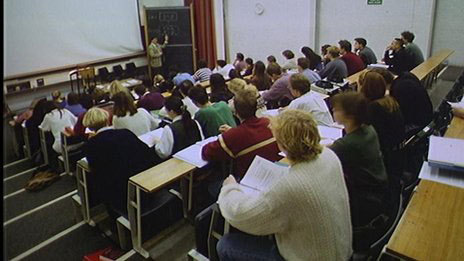高额学费导致英国大学生减少17% (双语)

高额学费导致英国大学生减少17%
The government says undergraduate numbers have 'returned to record levels'。
There was a 17% fall in the number of first year undergraduates at UK universities in the first year of higher tuition fees, official figures show。
In 2012-13 UK universities were allowed to treble their yearly fees to £9,000.
England saw a 12% fall in new full-time undergraduate students overall。
The government acknowledged the fall but stressed that demand for full time higher education has already "returned to record levels"。
A spokesperson for Department for Business, Innovation and Skills said the figures were influenced by a higher number of students taking up places the previous year, rather than having a gap year。
"A reduction in entrants in 2012 was well documented and the numbers were affected by the significant number of students who opted not to defer their place from the year before," she said。
'Direct consequence'
The decline had not continued into the current year, she added。
"Application rates for some of the most disadvantaged young people have risen to an all time high in England and more students than ever before are being successful in securing a place at their first choice institution."
The figures, collated by the Higher Education Statistics Agency (Hesa), are official confirmation of other indications that there was a fall in the number of people going to university last year。
Previously released figures had shown declines in applications and offers of places, and the admissions body Ucas also reported a fall。
In Scotland, where the government still pays for the tuition of Scottish students studying within the country, there was a 2% rise in the number of students taking up places on full-time undergraduate courses。
The academics' union, UCU, however, said the overall decline was a direct consequence of the rise in tuition fees。
The union's general secretary, Sally Hunt, said it was "no great surprise that the number of students going to university fell off considerably"。
She also believes there may be long-term effects。
"Only the government seemed to think the policy was progressive and, while we have seen a recovery in the number of people applying to university, the fear remains that some may never fulfil their potential because of the new funding regime," she added。
The Hesa figures also show a one per cent decline in non-EU students coming to the UK to study。
A rise in the numbers of students from China and Hong Kong was off-set by a 25% fall in Indian students。
It has previously been suggested they are being put off from the expense of study in the UK by a fall in the value of the rupee, and by improvements in Indian universities。
英国政府表示本科生数量“降至新低”。
官方数据显示,在第一年高昂的学费面前,英国大学的本科生的数量减少了17%。
在2012-13年间,英国大学被默许增加每年的学费至9000英镑。
英格兰新的全日制本科学生整体减少了12%。
政府承认总体数量有所减少,但强调对全日制高等教育的需求已经“回到过去的水平”。
英国政府商业创新和技术部的发言人表示,这数据受到了一些学生的影响,他们更多是提前一年申请上大学的,而不是选择间隔年。
她表示:“2012年的新生的减少也揭示,新生数量受到相当一部分学生的影响,他们没有选择从一年前推迟他们的位置。”
"直接的后果"
下降并没持续到今年,她补充道。
“在英国,一些处于弱势地位的年轻人的申请率已升到了一个前所未有的高度,比以往更多的学生成功地在他们的首选学校取得了一席之位。”
由英国高等教育统计局整理的数据,可以作为去年上大学人数减少迹象的官方确认。
此前发布的数据显示申请数和录取通知书发放数量有所下降,招生机构英国高校联合招生委员会也报道了下降。
而在苏格兰,政府仍然为苏格兰学生在国内的学习付费,全日制本科生人数总体有2%的增长。
大学联盟总秘长——萨莉。亨特表示,上大学的学生人数大幅度减少没什么好惊讶的。
她还认为这可能存在长期影响。
她表示:“只有政府认为政策是进步的,虽然我们已经看到申请大学的数量在恢复,但由于新的融资制度,人们仍然有顾虑,而有些人可能永远不会实现他们的潜力。”
英国高等教育统计局整理的数据同时显示了非欧盟学生来英国上大学人数减少了1%。
而来自中国内地和香港学生人数的上升被印度学生下降了25%的数量所抵消。
之前有迹象表明,由于卢比的贬值和印度大学整体的进步,印度的学生在英国高昂的留学[微博]费用面前望而却步。
- 英国大学海外生学费高昂2013-08-26 11:19
- 英国更多大学将收取9千英镑最高学费2013-07-15 16:18
- 学生认为英国大学课程质量欠佳对涨学费不满2013-05-17 08:31
- 英国学生上大学人数下降 学费高昂是主因2013-01-06 15:48
- 英国上调大学学费致学生减少竟取消课程2012-12-05 17:50
